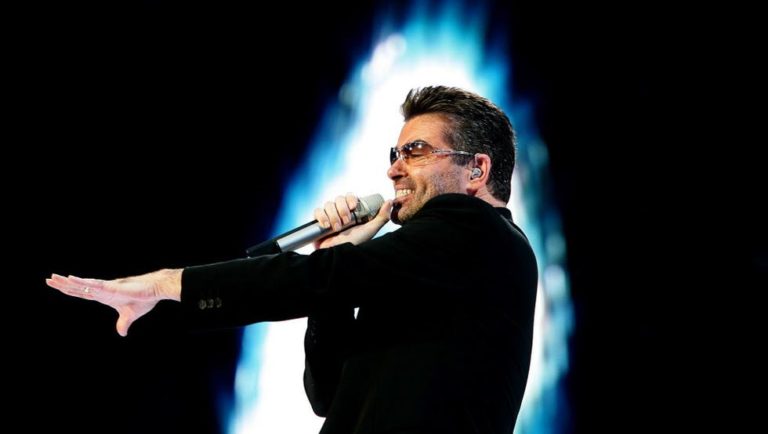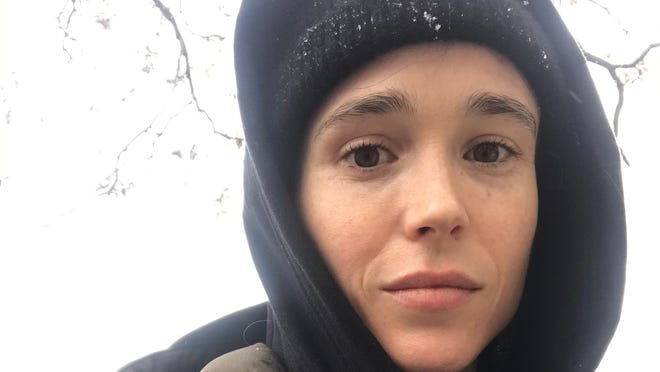
A few hundred pages. That’s how many pages writer Jack Guinness has devoted to queerness, inviting celebrities to contribute essays about their favorite queer icons in “The Queer Bible” (Dey St., 320 pp.)
We know what you’re thinking: How? How could one possibly contain the many (many!) multitudes of the LGBTQ community into a mere few hundred pages?
While the book couldn’t accomplish that, it comes close,celebrating queer heroes past and present, bold and beautiful, acerbic and astounding, people as different as George Michael, RuPaul and James Baldwin. Prepare yourself to fall into queerness quicksand.
The quotes below stood out as some of the most impactful – and just in time for Pride Month:
George Michael

Journalist Paul Flynn wrote a sprawling essay on musical sensation George Michael – though one quote (queerly) stood out about his albums “Listen Without Prejudice Vol. 1” and “Older.”
“Pick a song, any song, from those two records,” Flynn writes. “Pluck it on a guitar. Hum it aloud. Musically, it is The Beatles, The Stones, Sinatra, The Bee Gees and Stevie Wonder conjoined, punctuated by deferential references to them all. Lyrically, it is the tale of every gay man’s transcendence from the man he was taught to be to the man he was meant to be.”
David Bowie
We don’t want to think about a world in which David Bowie didn’t challenge heteronormativity.
“He problematized, destabilized or deconstructed heteronormative ideas of masculinity, gender and sexuality,” journalist Freddy McConnell writes. “He not only challenged but obliterated our notions of who was allowed to be a mainstream pop and rock culture icon.”
Divine
You likely know drag queen Divine by only that name. Singer Elton John penned a moving piece celebrating both Divine and the person out of drag, Glenn (Harris Glenn Milstead), who died of heart failure in 1988.
“For me, Glenn’s death will always feel tied up with the height of the AIDS epidemic,” John writes. “It isn’t just the coincidence of the timing, at the height of the pandemic. His life and career were cut short just as he was breaking into the mainstream, on the eve of his acceptance as Glenn. That feeling of lives being cut short, abbreviated at the precise moment they were blossoming, was commonplace. It was simultaneously heart-breaking.”
Oooh:The gay royal romance novel is having a moment: ‘Everybody deserves a happy ending’
RuPaul

We can thank “Drag Race” host and trailblazing drag queen RuPaul for the creation of “The Queer Bible,” really.
Guinness, who edited the collection, says of iconic drag queen: “RuPaul inspired me to create ‘The Queer Bible’; to create something beyond myself, something real. A platform for others to tell their stories in their own voices. A space and community for the next generation, who can joyously celebrate our culture and educate us about evolving concepts of gender and politics.”
Adam Rippon
Olympians Gus Kenworthy and Adam Rippon made history at the 2018 Olympics as two out gay men. Kenworthy reflected on his friendship with Rippon in a piece for the bible.

“It was a moment I’ll never forget for the rest of my life. The first time an openly gay man walked into a Winter Olympics opening ceremony – and it was not just a man, it was two,” Kenworthy writes.
‘Paris Is Burning’
Twirl into ballroom culture and watch “Paris Is Burning,” though familiarize yourself with criticism surrounding it, too.
“”Paris Is Burning’ ignited a spark in me,” model and activist Munroe Bergdorf writes. “It encouraged me to look further into Black queer history. It was the beginning of my awakening of self and community. Then I realized it was a Black trans woman that started the whole (expletive) thing! They fought for the rights that so many of the modern queer community enjoy today.”

‘Queer Eye’
Leave it to “Queer Eye” star Tan France to provide a poignant quote on the importance of gay friendship.
“As gay men, our friends are to a large extent more important to us than our family,” France writes. “They are the ones who mold who we are at a time when our identity might feel under attack. We become a product of our friendship circle.”
Noted:What if ‘The Great Gatsby’ was unquestionably queer? This author went there
Susan Sontag
Sontag’s 1964 essay “Notes on ‘Camp'” helped explain the term “camp” to journalist Amelia Abraham (and, obviously, many others). Think of it as “love of the unnatural: of artifice and exaggeration,” per Sontag. John Waters’ films (“Hairspray,” “Pink Flamingos”) are campy, for example.
“In camp, I felt like I had inherited a special gift, a secret language, a very particular kind of humor,” Abraham writes. “Camp felt like a weapon to use against the world when I might find myself up against homophobia – a source of joy in difficult times.”
James Baldwin
A book called “The Queer Bible” perhaps could only have ended with words on the magic of writer James Baldwin.
“I am lucky, so, so lucky to have been able to consult James Baldwin, to know that others have been angry, before me; others have thought about white supremacy and how it affects all our lives, before me; thought about what it means to be gay in the Black community and in the Church, before me,” writes British novelist Paul Mendez. “He is the writer who has perhaps had the greatest impact on my life, and as I have not yet read every word he has written, it thrills me to think that there is more inspiration, more affirmation, still to come.”
Yes please:10 new LGBTQ books to celebrate Pride Month: Gay ‘Great Gatsby,’ ‘Queer Bible,’ more
